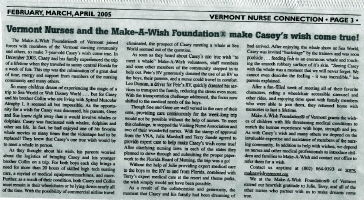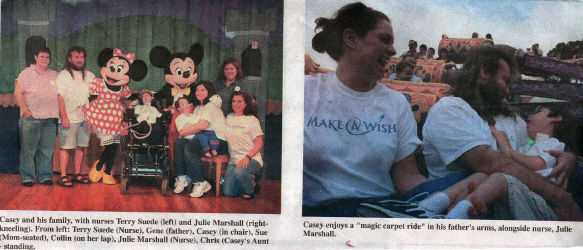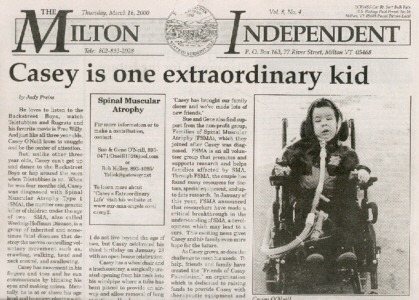| In The News...
Click on articles to Read




Vermont Nurses and the Make-A-Wish
Foundation Make Casey's Wish Come True!



Casey is One Extraordinary Kid by Judy Preiss
He loves to listen to the Backstreet Boys, watch
Teletubbies and Rugrats and his favorite movie is Free Willy. And just like all
three year olds, Casey O'Neill loves to snuggle and be the center of attention.
But, unlike other three year olds, Casey can't get up and
dance to the Backstreet Boys or hop around the room when Teletubbies is on. When he
was four months old, Casey was diagnosed with Spinal Muscular Atrophy Type 1 (SMA), the
number one genetic killer of children under the age of two. SMA, also called
Werdnig-Hoffman Disease, is a group of inherited and sometimes fatal diseases that destroy
the nerves controlling voluntary movement such as crawling, walking, head and neck
control, and swallowing.
Casey has movement in his fingers and toes and he can
communicate by blinking his eyes and making noises. Mentally, he is at or above his
age level and he enjoys playing with Play-Doh, blocks and his race track with the help of
his family and caregivers. He also uses an infra-red device, which connects to some
of his toys, and can be controlled with his fingers to make a toy work.
Casey is the only child in Vermont with SMA Type I, the
most severe form of the disease. Most children with SMA Type I do not live beyond
the age of two, but Casey celebrated his third birthday on January 23 with an open house
celebration.
Casey has a wheelchair and a tracheostomy, a surgically
created opening from his neck into his windpipe where a tube has been placed to provide an
airway and allow removal of lung secretions. He also uses a ventilator for
respiratory support and a feeding tube for nutrition. His parents, Sue and Gene
O'Neill, have learned how to use Casey's special equipment, and they are aided by daily
nursing care from the Visiting Nurse Association, as well as many other special services.
Through it all, "Casey is very easy going and very patient", says Sue.
"Casey has brought our family closer and we've made lots of new friends".
Sue and Gene also find support from the non-profit group,
Families of Spinal Muscular Atrophy (FSMA), which they joined after Casey was diagnosed.
FSMA is an all volunteer group that promotes and supports research and helps
families affected by SMA. Through FSMA, the couple has found many resources for
doctors, special equipment, and up to date research. In January of this year, FSMA
announced that researchers have made a critical breakthrough in the understanding of SMA,
a development which may lead to a cure. This exciting news gives Casey and his
family even more hope for the future.
As Casey grows, so does the challenge to meet his needs.
To help, friends and family have created the "Friends of Casey
Foundation", an organization which is dedicated to raising funds to provide Casey
with therapeutic equipment and handicap accessible needs. On April 9, 2000, there
will be a benefit to raise money for these needs. The group will also donate fifty
percent of the proceeds to FSMA to help with public awareness and research. The
benefit, sponsored by Jake's Original Bar & Grill in South Burlington and
"Friends of Casey", will feature dinner at Jake's from 4:30 p.m. to 6 p.m.
followed by live music, from Jenni & The Junketeers, and door prizes from 6-8 p.m.
The evening will end with Calcutta from 8-9 p.m.
Sue and Gene are both hoping to attend the benefit and
would like to bring Casey for a while. "I never ever imagined my life to be
this way, but I wouldn't change it", says the proud mother. "Casey has
such a great personality and sense of humor and he's just so fun to be around."
"We just keep thinking about helping him and hoping
for his future."
Spinal Muscular Atrophy
For more information or to make a contribution, contact:
Sue & Gene O'Neill, 893-0471/ Mommytocasey@yahoo.com
or
Bob Kelley, 893-4095/ Yellek@Agateway.net
To learn more about "Casey's Extraordinary Life", visit his
website at www.our-sma-angels.com/casey
There's a lesson to learn from all our Caseys by Emerson Lynn
Wherever Casey O'Neill goes, along with him goes his
specially-designed wheel chair, his ventilator and the suction device he needs to cope
with his Spinal Muscular Atrophy. The three year old takes nothing for granted.
Every breath is a blessing, every experience a gift.
Tuesday night was a restless one. His mom said he
didn't sleep a wink. Wednesday, he was going to the Welden Theatre to see a movie.
His first.
Casey was one of a 100 local children with special needs,
the types of children who might not be comfortable in public setting such as movie
theatres. Their wants are the same as any other child's, but realizing their hopes
doesn't happen that often. It's the story that always plucks the heart strings.
It's the story that often lies hidden behind the lines that families with special
needs children draw for themselves, or others draw for them.
But there they sat. All 100 of them. Popcorn
pressed to their hungry little chests. Eager eyes fixed on Robin Williams and the
movie "Bicentennial Man". It's hard to imagine the excitement they must
have felt.
For today's children, there are few things they don't have
and they take for granted comforts and experiences that have only become known to today's
children. For something to be exciting, it has to be extraordinary. That
comfort should carry with it a sense of wariness. It would do wonders if every child
could sit with the Caseys of the world to understand how blessed they are and to
understand life's fragility. There but for the grace of God....
That's something Mary Schumer of the Welden Theatre
understands. It's also what Mousetrap Pediatrics understands. And it's what
motivates groups such as Whatever It Takes to do whatever it takes to bring some joy to
these childrens' lives.
Whatever It Takes is a joint program with Mousetrap
Pediatrics and the University of Vermont. Its purpose is to develop programs to help
families and children with special needs. Going to the movies was only one of many
efforts.
In this age of excess, we give attention to Bill Gates when
he donates a billion dollars to MIT to study how the brain works.
We give attention to Ted Turner when he donates a billion
to the United Nations.
We give attention to Hollywood when its stars set aside
several hours for an AIDS benefit.
Sending kids to the movies in St. Albans? Not a big
thing.
Oh, but it is.
It's bigger than anything Bill Gates ever thought about.
It comes from the heart. It comes from one person who
looks directly into the eyes of another. Ask Fred Holmes who gently shook the hand
of a small young man at the Welden who just wanted to say thank you.
There's just not enough of that. Protest if you must,
but it's become too easy to give money, and eas8ier still to beg off by saying there's not
enough time to get involved. That's what's been happening to the Caseys of the
world.
Mary Schumer, of the Welden Theatre, said it right.
St. Albans is a small town..."we can do this here."
It's important that we do more. It's important that
we learn from the Caseys of the world and to take each breath as a blessing and each
experience as a gift.
Special Needs Child Going to the Movies
St. Albans-For a child like three-year-old Casey O'Neill,
of Milton, who suffers from Spinal Muscular Atrophy, the simple treat of going to the
movies is problematic.
Casey's condition requires a number of care givers when he
travels, in addition to a ventilator and other medical equipment.
"We come with quite an entourage to care for
Casey" said his mother Sue O'Neill. "Plus, with the noise of Casey's
ventilator and suction equipment and all the moving around that would be necessary, we
would probably be interfering with others enjoying the movie." Still, like any
young child, going to the movies would be a thrill.
Situations like this are just some of the obstacles which
confront children with special health needs and their families. The "Whatever
It Takes" initiative between Mousetrap Pediatrics and the University of Vermont is
working to help families overcome those obstacles through efforts as complicated as
interagency care coordination to things as seemingly simple as going to the movies.
As a midwinter treat for children like Casey and their
families, "Whatever It Takes" and the Welden Theatre in St. Albans are hosting a
special matinee on Wednesday at 3 p.m.
Mary Schumer, the owner of the Welden, is donating tickets
for any child with special health needs and one caregiver. Other friends and family
members are welcome to attend and will be sponsored by Mousetrap Pediatrics and the Welden
Theatre.
The idea for the trip to the movies came from Jo Berry, a
UVM Social Work student involved in Whatever It Takes. "She has been working
with Casey and our family and going to his various appointments and one of the nurses
mentioned how she thought Casey would love to go to the movies some day.
Berry picked up on it and brought the idea of a special day
at the movies back to her advisors," said Mrs. O'Neill. "It will be nice
to take Casey to the movies and not feel really conspicuous doing it."
Whatever It Takes is a unique collaborative learning
initiative between Mousetrap Pediatrics, the UVM Department of Social Work, the UVM
College of Nursing, the Department of Pediatrics at the UVM College of Medicine, and the
Champlain Valley Area Health Education Center.
Through this program, UVM graduate and undergraduate
students work directly with families of children with special health needs in Franklin
County to help them overcome the obstacles they face.
"It's all intended to look at the manner in which
children with special needs either do or do not get care by working intensely with the
families," said Fred Holmes, M.D. of Mousetrap Pediatrics in St. Albans.
"To help, you need to spend time with the family and really begin to understand some
of the root problems which they face."
The "Whatever It Takes" faculty includes Dr.
Holmes, Mary Skidmore Taylor, MSW, of the Department of Social Work, Kathy Marn, R.P.T.,
the Rehabilitation Manager at Franklin County Home Health Agency; and Tracey Wagner, R.N.,
the parent consultant for Whatever It Takes.
The program was initiated with funds from the Vermont
Department of Health and the American Academy of Pediatrics. It is currently funded
by donations from Mousetrap Pediatrics and the Vermont Department of Health, Division of
Children with Special Health Needs.
Two Thumbs Up!
Whatever It Takes, Welden Theatre make movie magic by Leo
Rowland
St. Albans--In 10 years, Casey O'Neill might remember the
day he saw his first movie on the silver screen-Wednesday, Feb. 9, 2000.
When the lights dimmed for the start of "Bicentennial
Man", starring Robin Williams, Casey, a three-year-old from Milton, was not alone.
It was a full house including some 100 children who, when plans for catching a
movie are cooked up, often have to stay home.
Things were different Wednesday, thanks to a bevy of caring
organizations and individuals that united to pull off a memorable day for local children
with special needs.
Whatever It Takes, a joint initiative involving Mousetrap
Pediatrics and the University of Vermont (UVM), was developed to assist families and
children with special health problems.
Its partner on Wednesday was the Welden Theatre which
opened its doors for the event.
And the kids were kids.
They scampered back and forth down the halls before the
movie began, the parents trying to keep them in tow.
When the moms and dads stepped in line for popcorn, candy,
and soft drinks, the kids flocked to them, giving up their chance to run free.
Sam Peterson, of the giant drug company Pfizer, had
arranged to donate the refreshments for the afternoon.
After making their way through the snack line, the tail of
which seemed to have no end, the children trundled back to their seats, oversized bags of
popcorn pressed against their chests.
In the doorway to the screening room, a small boy prodded
by his slightly older brother, walked sheepishly up to Dr. Fred Holmes, an organizer of
the event.
"Thank you", the boy said.
Dr. Holmes bent down and shook the child's hand.
"You're very welcome", he replied.
"The system is so complicated," Holmes said,
standing back and watching the kids bounce past. He praised the work of the
university, the network of organizations and individuals who work with special needs
children to simplify things.
"They work so intensively", he said.
When the movie began, children tittered and whispered to
the kids next to them and to the adults who leaned in to hear them.
Jo Berry, a senior social work major at UVM, first brought
the idea of going to the movies to her departmental advisor, Mary Taylor.
Berry had been working with Casey O'Neill and his family.
The boy suffers from Spinal Muscular Atrophy and a ventilator and suction device
that he requires must be taken with him wherever he travels.
The boy's wheelchair is long and Casey rests in it in a
near prostrate position. According to Berry, because of the electronic fluttering sound
the instruments make, the family has been hesitant to take Casey to the movies for fear of
distracting others.
It was one of the nurses who attends to Casey, however, who
told Berry he would love to go to the movies.
Sue O'Neill, Casey's mother, said that she and her husband,
Gene, had planned to take their son to the drive-in last summer. The plan never came
to fruition, so Casey's chance to see a movie on the big screen was put on hold, until
yesterday.
According to his mother, Casey knew what was on tap the
evening before and could hardly wait.
"He didn't sleep last night because I think he
recognized it", she said, in reference to his first movie-going experience.
Berry had contacted Dr. Fred Holmes of Mousetrap Pediatrics
in St. Albans who suggested she get in touch with Mary Schumer, the owner of the Welden
Theatre.
Schumer said she frequently plays host for special
screenings for educational and benefit purposes, and agreed to the idea. She even
donated a pair of tickets for each child and his or her caregiver.
Mousetrap Pediatrics picked up the tab for the remaining
friends and family who were welcome to tag along.
As the projector rolled and Robin Williams mechanically
moved about in the role of an android, all went quiet.
Schumer was behind the counter with her son. She
robbed his black toss of hair, firmly and loving, as mothers do.
She looked down the hall back to where the children were.
"It's a small town," she said. "We can
do this here".

 |